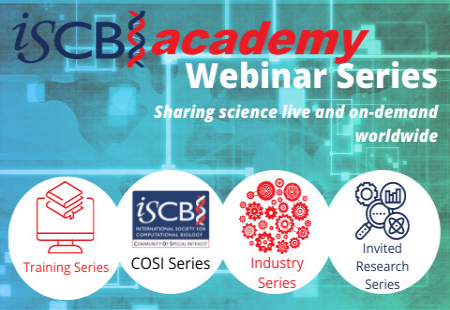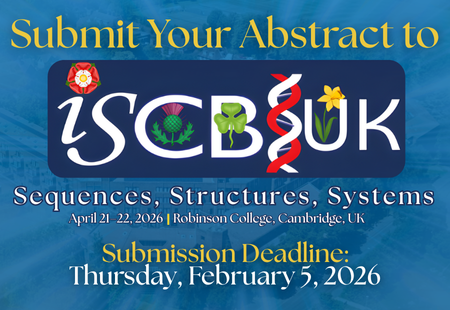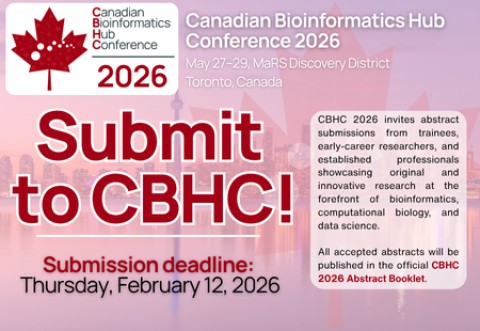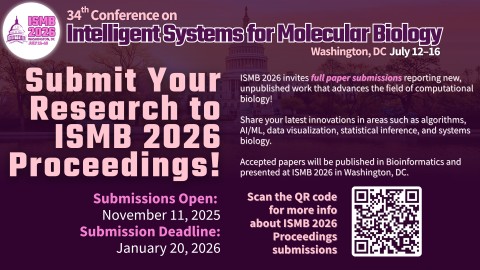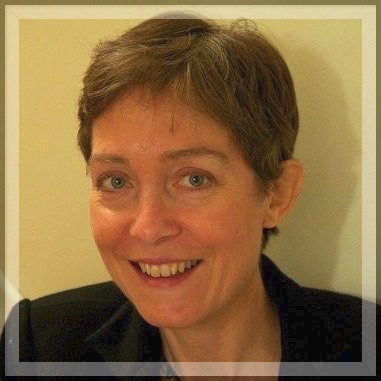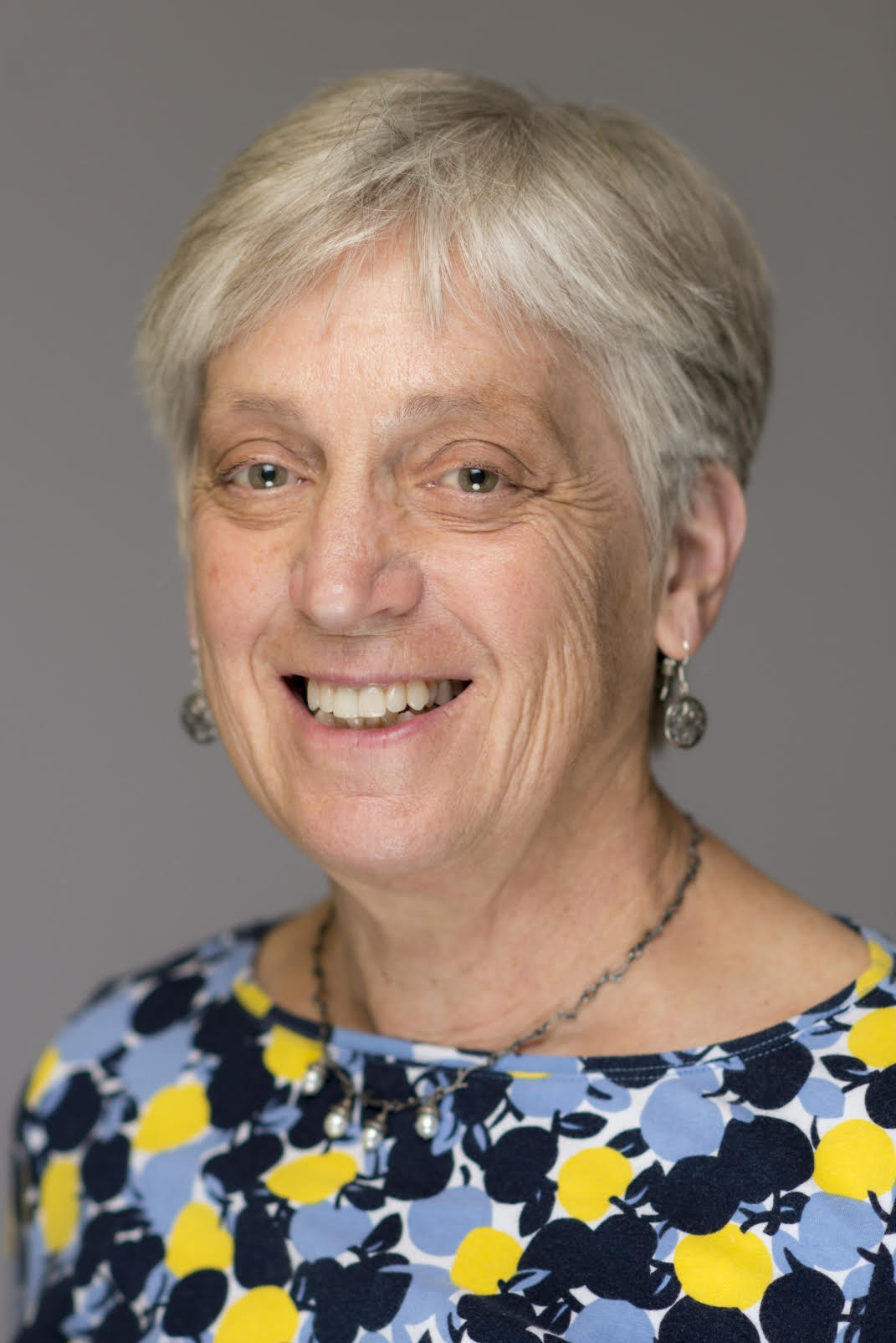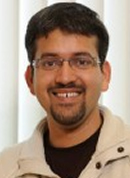 |
2018 ISCB Innovator Award
M. Madan Babu
|
2018 ISCB Innovator Award: M. Madan Babu
The ISCB Innovator Award recognizes an ISCB scientist who is within two decades of having completed his or her graduate degree and has consistently made outstanding contributions to the field of computational biology. The 2018 winner is Dr. M. Madan Babu, Programme Leader at the MRC Laboratory of Molecular Biology, Cambridge, UK. Madan received his award and delivered a keynote presentation at the 2018 International Conference on Intelligent Systems for Molecular Biology in Chicago, Illinois, held on July 6-10, 2018.
M. MADAN BABU: PEERING INTO THE REALM OF REGULATION
M. Madan Babu is the head of the Regulatory Genomics and Systems Biology group at the MRC Laboratory of Molecular Biology, Cambridge, UK. His work focuses on understanding how cellular systems are regulated at different scales (molecular, systems, and genomic levels) and how this impacts genome evolution.
Madan grew up in Chennai, India and developed early interests in computer science and biotechnology. As a young child, he has vivid memories of his father bringing home a personal computer, and soon after he became interested in learning to program. He also remembers when his family first started using the internet, and recalled, “In the mid-90’s, we started having access to the Internet. This made a big difference in the days where access to information beyond textbooks was not readily available; so thanks to my father I had these opportunities early in my life.” Madan discovered biotechnology as a high school student, and attributes his lifelong interest in biology to the impact of his biology teacher, Dr. M.C. Aruna, who discussed foundational biological concepts with him, including how genetic information can be used to understand living systems. Madan went on to pursue a Bachelor of Technology (Biotechnology) degree at Anna University, Center for Biotechnology in Chennai, India. He first became of aware of computational biology during his first year undergraduate research internship, at which time he was exposed to the work of Cyrus Chothia and Arthur Lesk in a course on protein structure. He became fascinated with this research area and then delved into seminal papers on computational genomics, protein engineering, and structural bioinformatics. As an intern, Madan pursued undergraduate research under the guidance of Prof. Balaram and Prof. K. Sankran, and saw this a key turning point in his career path. He recollected, “We started applying methods from computer science to study protein sequences and structures. For the first time, I experienced how to define a scientific problem, develop computational methods to solve it, and write up and defend the findings for publication. This really got me excited and that was when I decided that I would like to pursue a career in computational biology.”
Madan recognizes that his interest in computational biology was fostered by his ability to access publicly-available protein and genomic data on his own computer, as well as the open access he had to lecture materials, methods and algorithms from computational biologists spanning the globe. He said, “I cannot forget the day when I wrote an email to RCSB from India and received a 5-part CD-ROM with coordinate data for all protein structures. Being able to look at protein structures using RASMOL from home and writing FORTRAN programs to analyze structures as an undergraduate student was one of the most exciting experiences that really captured my interest in the field.” Madan left India in 2001 to pursue his PhD in computational genomics at the MRC Laboratory of Molecular Biology and Trinity College, University of Cambridge, UK under the guidance of Dr. Sarah Teichmann. His PhD research explored various aspects of gene regulatory networks, and marked the beginning of a very fruitful mentorship under Teichmann. Madan carried out his postdoctoral training at the National Center for Biotechnology Information, NIH in Bethesda, MD, USA under the guidance of Dr. L. Aravind, during which time he learned the importance of having broad interests in diverse subject areas as well as critically analyzing the complexity of biological systems at every possible level of detail. After a brief but extremely productive postdoctoral fellowship, Madan became a group leader at the age of 26 of the Regulatory Genomics and Systems Biology Group at the MRC Laboratory of Molecular Biology in 2006. As a PI, he has come to appreciate how his team of scientists can work together to tackle scientific questions on a much larger scale and shed new light on long-standing, fundamental questions. He said, “One of the things that I really enjoy about the field of computational biology is that you really integrate knowledge from various disciplines-- biology, statistics, computer science, mathematics, physics and chemistry. This means our lab is an amalgamation of people across disciplines that are really passionate about using interdisciplinary approaches to solve the problems they are working on.”
Madan’s group currently focuses on several areas of research, including studies on G-protein coupled receptors (GPCRs), a protein family involved in almost every aspect of human physiology and targeted by numerous drugs. Madan’s group is also using a combination of computational and experimental approaches to discover which parts of unstructured protein regions are functional and understand what makes them functional. His group is interested in applying developments in statistical learning and advances in large-scale genome sequencing to better understand natural variation in the human population as well as gain insight into how genomic variation impact rare and common diseases.
Madan is greatly honored to be selected as the recipient of the 2018 ISCB Innovator Award. He is grateful for his academic mentors and colleagues, including Sarah Teichmann, L. Avarind, Cyrus Chothia, Michael Levitt, Veronica Van Heyningen, Eugene Koonin, Stephen Michnick, Richard Kriwacki, Uri Alon, Arthur Lesk, Alexey Murzin, Julian Gough, Daniela Rhodes, Gebhard Schertler, Peter Wright, Keith Dunker, Janet Thornton, Tom Blundell and Venki Ramakrishnan, who have inspired him through their work and/or provided him valuable advice at various stages of his career. He is also appreciative of his past and present group members, and the MRC Laboratory of Molecular Biology for the freedom to develop new skills and take risks in pursuing research that pushes scientific boundaries. Last but not least, he is grateful to his parents, sister, wife and 2-year old son for their love, support and inspiration.
_______________________________________________________
Full bibliographical articles profiling the award recipients please see the ISMB 2018 focus issue of the ISCB newsletter as well as the ISCB Society Pages in PLOS Computational Biology and OUP Bioinformatics. Later this year, articles will be publish in F1000 Research ISCB Community Journal.
top
>> Return to Innovator Awards page
|

|
2020 ISCB Accomplishments
by a Senior Scientist Award:
Steven L. Salzberg, PhD
|
2020 ISCB Accomplishments by a Senior Scientist Award: Steven L. Salzberg, PhD
Steven L. Salzberg, PhD, Bloomberg Distinguished Professor, Professor of Biomedical Engineering, Computer Science, and Biostatistics; Director, Center for Computational Biology, McKusick-Nathans Institute of Genetic Medicine, Johns Hopkins University School of Medicine
A Journey between Industry and Academia
Steven Salzberg grew up in Columbia, SC.
Throughout his childhood and young adulthood, he was always interested in science and deeply enjoyed reading science fiction. Salzberg was also fascinated by astronomy and considered studying physics. As an undergraduate at Yale University in the 1970's, he explored several majors and thought he had settled on English Literature but added Computer Science as a second major upon taking an introductory computer programming class. He recalled, “ This is the kind of math I thought I would really like to study,” and he was soon captivated by artificial intelligence (AI) and natural language processing. At the advice of his undergraduate advisor, Salzberg spent a year after graduation gaining more programming experience by working at a local power company in South Carolina, where he worked on an IBM mainframe and used self- t raining courses to learn COBOL and IBM assembler. Salzberg said, "It was a very boring sort of application, but I was still interested in programming. I liked the idea I could work on something technical, and within a short period of time, I would have results that would do what I intended.”
Salzberg returned to Yale and completed his M.S. in computer science. He then joined a startup in Boston during the first blush of AI, although this and many other AI startups failed in the late 1980's due to lack of computing power and other technical limitations.
One of Salzberg’s advisors at the startup was AI pioneer Bill Woods, who held an adjunct appointment at Harvard University and later became Salzberg’s graduate advisor in the Department of Computer Science. Salzberg had managed to avoid taking any biology classes as an undergraduate, but he heard about the Human Genome Project (HGP) while he was in graduate school in the late 1980's. He said, “The Human Genome Project sounded like the most exciting thing in all of science at the time, and I wanted to be a part of that.” While completing his PhD project in machine learning, he started sitting in on biology classes, including a course by the late Stephen Jay Gould, and reading on his own to learn about genomics and genetics. He was determined to figure out a way to using his computing knowledge to get involved in the HGP.
Salzburg continued doing research in machine learning as he started in his first academic position at Johns Hopkins University. He was still curious about genomics and recalled going to a talk in the early 1990's by Temple Smith about sequence differences between exons and introns. It dawned on Salzberg that he could use machine learning to distinguish exons from introns, which could be used as a strategy for gene finding. This became Salzberg’s entrance into genomics.
During this time, Salzberg was also introduced to Nobel Laureate Hamilton Smith, a notable microbiologist who discovered type I I restriction enzymes. Salzberg recalled, “[Smith] had a secret passion for computer programming. He wanted to talk to computer scientists who were interested in genomics -- that was me. And I was interested in learning more about genomics.” Salzberg and Smith began working together to understand how computer programs could be made for tasks like gene finding. Smith had also started collaborating with J. Craig Venter, and in 1997, both Smith and Salzberg began working at Venter’s non-profit research institute, The Institute for Genomic Research (TIGR).
Salzberg became the Director of Bioinformatics at TIGR and developed with his colleague Art Delcher the GLIMMER gene finder, a software system still used today to identify coding regions in bacteria, archaea and viruses. In the early 2000's, the first Mycobacterium tuberculosis genomes were being sequenced by both TIGR and The Sanger Center. This led Salzberg and his colleagues to develop MUMmer, a system that could be used to compare large genomes. He also got involved in the HGP through the development of a gene finder that could analyze the human genome and, with his colleague Mihaela Pertea, also built other eukaryotic gene finders for plant, fungus, and parasite genomes. Salzberg and his colleagues were called upon by the FBI after the 2001 anthrax attacks to analyze the genome of the anthrax bacteria, and that work identified genetic mutations that eventually pinpointed the source of the bacteria to a biodefense lab in Fort Detrick, Maryland. In 2003, Salzberg co-founded the Influenza Genome Sequencing project with David Lipman, which involved the sequencing and analysis of thousands of influenza isolates.
Salzberg then moved to the University of Maryland, College Park in 2005 , where he was the Horvitz Professor of Computer Science. He returned to JHU in 2011 , where he is currently the Bloomberg Distinguished Professor of Biomedical Engineering,
Computer Science, and Biostatistics and the Director of the Center for Computational Biology in the Whiting School of Engineering. As next- generation sequencing ( NGS) technology developed, Salzberg’s research interests shifted toward developing algorithms for large- scale genome assembly and sequence alignment, including the development of the open- source Tuxedo suite of programs (Bowtie, Tophat and Cufflinks).
Salzberg’s current interests include the development of an improved human gene catalog and assembly and annotation of an Ashkenazi human reference genome. Recent technical advances have made this undertaking feasible, and the research community has desperately needed other reference genomes beyond the only publicly available genome, GRCh 38 . Salzberg is also working with colleagues on developing methods for using shotgun sequencing as a diagnostic tool for infectious diseases. They have tested their techniques on biopsy materials from patients with difficult-to-diagnose brain infections and on samples collected from eye infections, and the technology has the potential to work on a much broad range of infections.
Salzberg has trained numerous students and postdoctoral fellows throughout his time in academia and at TIGR, and he has focused on matching highly motivated individuals with projects that get them excited. Like many computational biologists, Salzberg is continually in search of interesting data associated with problems that matter, whether they involve the nature of the human genome, human health and disease, or any of a much broader range of microbial, plant, and animal genomes. Salzberg’s body of work includes more than 300 publications, including many highly cited manuscripts. His contributions have been recognized through his election as a member of the American Academy of Arts and Sciences, a Fellow of the American Association for the Advancement of Science (AAAS), a Fellow of the International Society for Computational Biology (ISCB), and a member of the Board of Scientific Counselors of the National Library of Medicine at NIH. All of Salzberg’ s bioinformatics systems have been released as free, open-source software, and he won the 2013 Benjamin Franklin Award for Open Science for his advocacy of open- source software and of open sharing of genome sequence data. Salzberg is also a contributor to Forbes magazine and writes a widely read column that debunks pseudoscience and explains scientific and medical findings with honesty and clarity.
Salzberg is greatly honored to be the 2020 recipient of ISCB’ s Accomplishments by a Senior Scientist award. He has always felt at home at ISMB meetings since their inception and is touched by this award since it is bestowed upon him by his computational biology colleagues.
_______________________________________________________
ISCB will present the Accomplishments by a Senior Scientist Award, Overton Prize, Innovator Award and Outstanding Contributions to ISCB Award, at ISMB 2020 (www.iscb.org/ismb2020), which will take place in Montreal, Quebec, Canada, July 12-16, 2020 where, in addition, Peng, Liu, and Salzberg will present keynote addresses during the conference.
Full bibliographical articles profiling the award recipients will be available in the ISMB 2020 focus issue of the ISCB newsletter later this year, as well as the ISCB Society Pages in OUP Bioinformatics, and F1000 Research ISCB Community Journal.
top
>> Return to the Accomplishments by a Senior Scientist Award page

